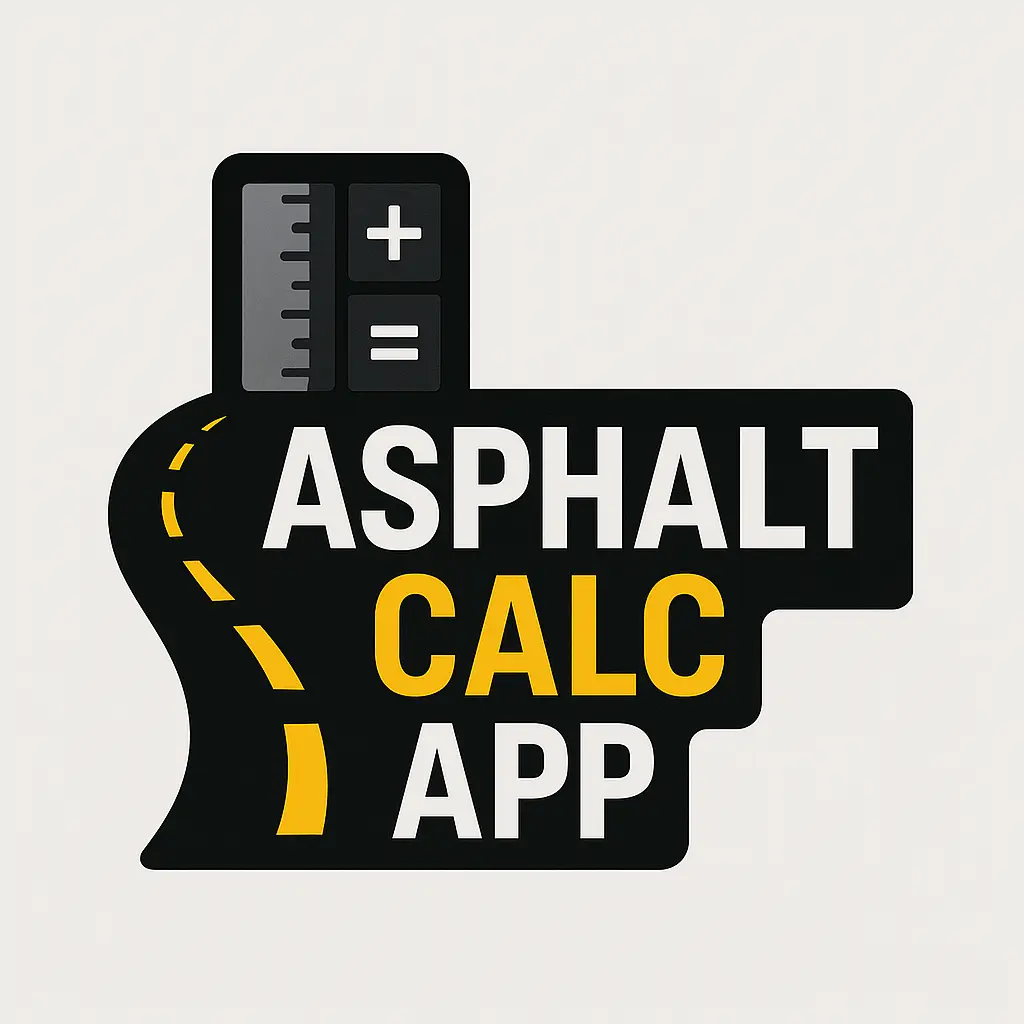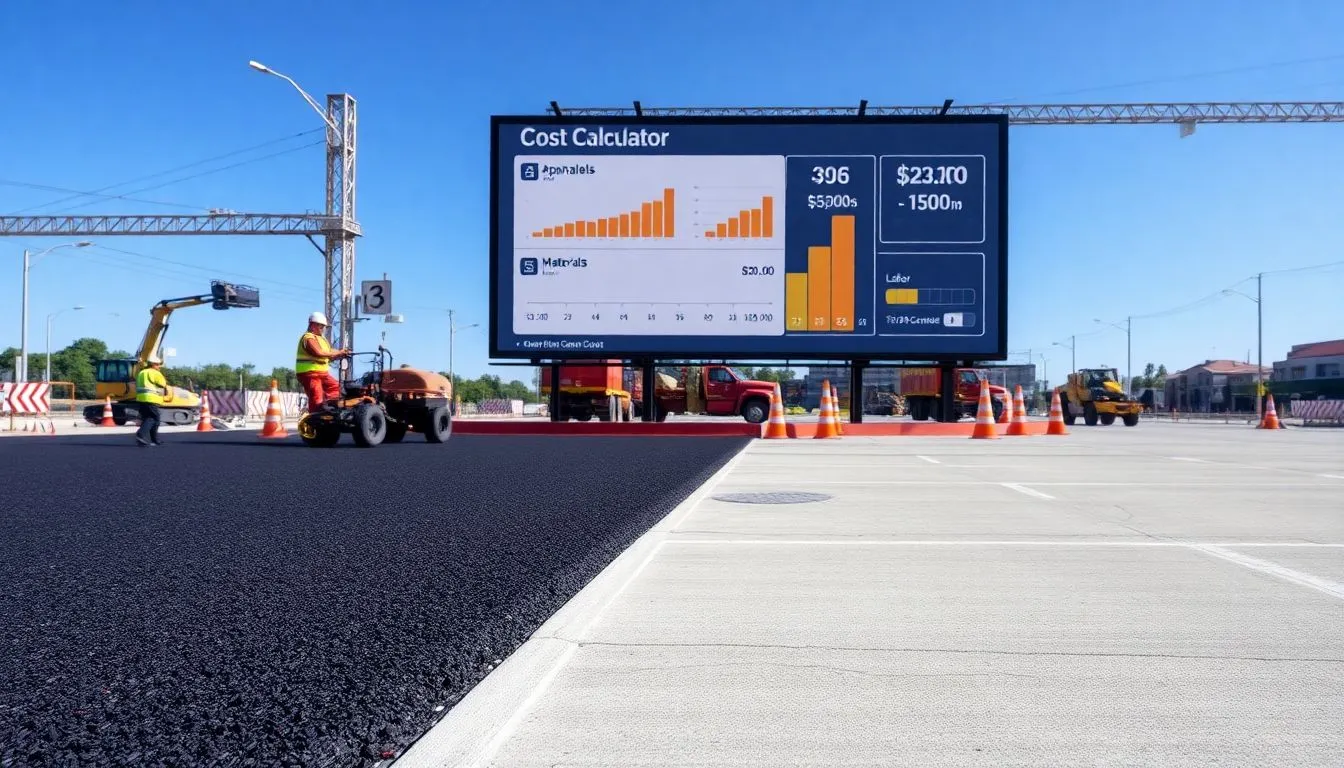It’s critical to estimate the cost of paving a parking lot or driveway. Whether you decide on asphalt or concrete, understanding your budget helps prevent surprises later. Costs can change based on material prices, labor, and project size. This process is made simpler, and you get a better image when you use a cost calculator. This guide compares asphalt and concrete costs by breaking down key factors. It helps you pick the best surface for your space and budget.
Understanding the Basics of Asphalt and Concrete
What is asphalt?
The black, sticky mixture of bitumen and gravel is called asphalt. You find it on roads, driveways, and parking lots. It’s flexible, easy to install, but needs regular maintenance. Its smooth surface makes it a favorite for driveways that get heavy use.
What is concrete?
Cement, sand, gravel, and water are the ingredients of concrete. It’s used for sidewalks, patios, and commercial floors. Concrete offers a hard, durable surface that lasts for decades with proper care. Many choose it for its strength and clean appearance.
Key differences in properties
- Durability: Concrete often lasts longer, especially in heavy-use areas. Asphalt can soften in high heat, but it is easier to repair.
- Maintenance: Asphalt needs sealing every few years. Although concrete requires less maintenance, temperature changes can cause it to break.
- Aesthetic appeal: Concrete can be stamped or colored. Asphalt usually remains black but offers a smoother look.
- Environmental impact: Asphalt is recyclable. Concrete has a higher carbon footprint, but can also be recycled.
These variations affect not just your initial costs but also your costs over time.
Factors Affecting Asphalt and Concrete Costs
Material costs
Current market prices vary, but generally are:
- Asphalt: $2 to $4 per square foot
- Concrete: $4 to $8 per square foot
Prices depend on local suppliers, source quality, and your project size.
Labor costs
Labor makes up a significant part of total costs. Asphalt installation is generally quicker and cheaper. Concrete work is more labor-intensive, often costing more per square foot. Regional wages also influence prices, with some areas charging more.
Site preparation and base work
Proper groundwork is essential. Costs increase if the site needs excavation, grading, or stabilization. Poor soil conditions or limited access can add extra expenses.
Thickness and thickness variations
Thicker surfaces cost more in materials and labor. For driveways, standard thickness is 4 inches. For heavy loads, thicker slabs or layers are needed, raising costs.
Additional features and finishes
Extra details like stamping, coloring, or sealing add to costs. For example, decorative stamped concrete can double or triple your original price. Sealants improve longevity but also increase the budget.
How to Use an Asphalt vs Concrete Cost Calculator
Components of a cost calculator
A good calculator includes entry points for:
- Area in square feet
- Desired thickness
- Material type (asphalt or concrete)
- Location’s labor rates
- Optional finishes or features
It provides:
- Total cost estimate
- Material quantity needed
- Labor hours and costs
Step-by-step guide to input data
First, measure your space carefully. Input the size, select your preferred surface, and choose any finishes you want. Be honest about site conditions, as they affect costs.
Interpreting the results
Review the estimate to compare asphalt and concrete. Look for ways to save, like opting for standard finishes. Remember, calculators give ballpark figures, not exact prices. Always get local quotes to confirm.
Real-World Cost Comparison Examples
Residential driveway installation
In most regions, asphalt costs around $3 per square foot, while concrete averages $6.50. If the driveway is 300 square feet, asphalt might cost $900, while concrete could hit $1,950.
Homeowners often choose asphalt for its lower initial cost, but consider how long each surface lasts.
Commercial parking lot project
A large lot (10,000 sq ft) might cost $30,000 for asphalt versus $50,000 for concrete. Concrete suits long-term projects because it has lower maintenance needs. If the budget allows, concrete offers better durability.
Renovation of existing surfaces
Overlaying asphalt or concrete may cost less than full replacement. Repair costs depend on the level of damage. Sometimes, repairs make more sense than complete removal and new paving.
Expert Tips for Accurate Cost Estimation
Get multiple quotes
Talking to several local contractors ensures you’re not overpaying. Each quote may differ based on their experience and current costs.
Consider long-term costs
Lower starting costs could result in higher maintenance costs. Think about how long the surface will last and how much upkeep it needs.
Use detailed measurements
Accurate measurements prevent underestimating or overestimating costs. Include any additional features or special finishes from the start.
Incorporate project-specific variables
Be honest about your climate and planned use. Hot summers, cold winters, or frequent heavy loads can change your material choice and cost estimates.
Conclusion
Choosing between asphalt and concrete depends on cost, durability, and looks. Asphalt tends to be cheaper upfront but requires more repairs. Concrete costs more initially but lasts longer with less maintenance. Using an online cost calculator simplifies finding out your budget needs. It helps you make smarter decisions aligned with your goals. Always gather local quotes, think about long-term costs, and consider your specific project requirements. The right surface balances cost, function, and lifespan. For precise estimates, combine online tools with expert advice.
Q: Is asphalt or concrete cheaper in the long run?
A: Asphalt is cheaper upfront, but concrete may cost less over time due to lower maintenance needs.
Q: Which surface lasts longer—concrete or asphalt?
A: Concrete typically lasts 30–40 years with minimal upkeep, while asphalt may last 15–20 years but requires more maintenance.
Q: Can I install asphalt or concrete myself?
A: Both materials require specialized equipment and skill. DIY projects may lead to uneven surfaces or poor drainage.
Q: Do weather conditions affect asphalt or concrete more?
A: Asphalt can soften in extreme heat, while concrete is prone to cracking in freeze-thaw climates.
Q: How accurate are online cost calculators?
A: Cost calculators give helpful estimates, but actual prices may vary based on location, site conditions, and labor rates.
Start planning your project today—use a cost calculator and talk with local professionals to lock in the best deal.

